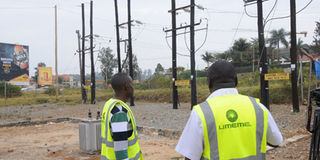Cut Umeme’s return on investment to 14 per cent, says UEDCL

Although there has been no conclusions, negotiation to review Umeme’s 20-year concession, which is expected to expire in March 2025, are underway. PHOTO/FILE
What you need to know:
- Mr Paul Mwesigwa, the UEDCL managing director, said the 20 per cent return on investment for Umeme, as it is under the current concession, is not competitive and ought to be revised downwards.
Uganda Electricity Distribution Company Limited (UEDCL), the owners of the assets operated by Umeme, is proposing that the return of investment (ROI) for the power distributor’s future concession, which is currently under negotiation, should not exceed 14 per cent.
Mr Paul Mwesigwa, the UEDCL managing director, said the 20 per cent return on investment for Umeme, as it is under the current concession, is not competitive and ought to be revised downwards.
“We want to see a competitive rate that is fair and comparative in the sector and [within the] region. We have benchmarked some ROI by private investors in East Africa, southern Africa and some Asian countries. Not 20 per cent! That is not competitive. It might be between 8 per cent and 14 per cent based on the market forces. That is our dream. If we get lower than that, no problem, since we are comparing with other utilities,” he said.
UEDCL signed a lease and assignment agreement with Umeme in May 2004, to manage and operate its assets, under a concession, which awarded Umeme a return on investment of 20 per cent.
The 20 year concession, which is set to expire in March 2025, is currently under negotiation by a committee consisting of different stakeholders among them UEDCL and Electricity Regulatory Authority, among others representing interests of government.
It is reported that the negotiations between government and Umeme have bred a consensus on collection and energy loss targets, leaving the ROI and tenure of the contract among others under discussion.
Mr Mwesigwa said the negotiations are still ongoing in regards to investment requirement for Umeme during the next concession.
“There are different items, talking about the investment needs, how much should be contributed by Umeme and how much should be contributed by government because it has become evident that you cannot achieve government’s agenda of 100 per cent connection on 100 per cent private financing,” he explained noting that the process is expected to be concluded by March next year. A 2019 Ministry of
Energy diagnostic study review, Mr Mwesigwa said, revealed that there is an investment requirement of $5.5b in power distribution if the 100 per cent connection agenda is to be realised.
The UEDCL 2018/19 report released recently revealed that Umeme has invested $584.9m since 2005 to 2018.
UEDCL performance
Mr Mwesigwa made the remarks while commenting on the company’s 2018/19 performance report which indicated increased revenues from Shs54.1b in 2018 to Shs70.5b in June 2019.
The growth in revenue performance was underpinned by reduction in revenue leakages through reduction of energy losses as well as increased connections through the electricity connections policy.
UEDCL reduced operation losses from 29 per cent in 2017/18 to 20.1 per cent in 2018/19 attributed to automation of power sales processes such as shifting all its domestic customers to prepaid metering systems.
UEDCL also attributes the increased revenue to sale of poles from its pole processing plant.
As a result, UEDCL has secured 75 acres of land at Shs800m to expand its pole processing plant beyond the 3.5 acres currently at Lugogo, which is expected to boost its production to 100,000 poles annually from 25,000 through addition of three production lines.
UEDCL which handles 8 non-concessional service territories also reported an increase in customer numbers from 53,212 in June 2018 to 67,678 in June 2019 and power reliability of 93 per cent against a target of 95 per cent.
Outlook: The power distributor will seek to grow its staff numbers from 340 employees currently to 700 by 2025.




